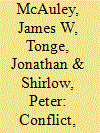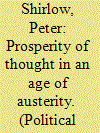|
|
|
Sort Order |
|
|
|
Items / Page
|
|
|
|
|
|
|
| Srl | Item |
| 1 |
ID:
094863


|
|
|
|
|
| Publication |
2010.
|
| Summary/Abstract |
Following the 1998 Belfast Agreement in Northern Ireland, levels of paramilitary violence have declined substantially. Among loyalists, the Ulster Volunteer Force (UVF) and associated Red Hand Commando (RHC) have formally renounced violence, and dissolved their 'military structures', and perhaps the most reticent of all of the major paramilitary groupings, the Ulster Defence Association (UDA), has taken on board the central tenets of conflict transformation, and 'stood down' all of its 'active service units' in the Ulster Freedom Fighters (UFF). Thus, paramilitary violence now is mainly confined to the activities of 'dissident' republican groups, notably the Real and Continuity IRAs, although low-level sectarian violence remains a problem.
Such dramatic societal and political change has resulted in a focus on the roles of formal party political leadership as agents of social change. This gaze, however, tends to obscure other important events such as the efforts, structures and approaches taken at the grassroots level to uphold and sustain conflict transformation and to maintain a reduction in violence. This article provides analysis of the role played by former loyalist paramilitary combatants in conflict transformation, and draws on material obtained through significant access to those former paramilitaries engaged in processes of societal shifts. In both personal and structural terms there is evidence of former combatants working to diminish the political tensions that remain as a result of the long-term inter-communal hostility developed across decades of violence and conflict.
|
|
|
|
|
|
|
|
|
|
|
|
|
|
|
|
| 2 |
ID:
106855


|
|
|
|
|
| Publication |
2011.
|
| Summary/Abstract |
This article considers in detail loyalist paramilitary activity in Northern Ireland since the paramilitary cease-fires of 1994. The continuing nature of contemporary loyalist violence is documented with reference to sectarian attacks against members of the "Other"/Catholic community and associated symbols of that community, violence directed at other loyalists, and the potential for future violence given constitutional uncertainty regarding Northern Ireland's position within the United Kingdom. The article also challenges assumptions within the broader literature of an inability within loyalist paramilitary groups to move beyond violence in the post-cease-fire period with particular reference to their conflict transformation efforts.
|
|
|
|
|
|
|
|
|
|
|
|
|
|
|
|
| 3 |
ID:
134688


|
|
|
|
|
| Summary/Abstract |
In the closing months of 1994, the principal paramilitary organizations in Northern Ireland declared that their campaigns of violence were at an end. The cease-fires called by republican and loyalist groupings represented the most significant heralds of a complex process of conflict transformation that continues to unfold even twenty years on. In this introduction, we set out to map the key developments that have shaped the tortuous narrative of the Northern Irish ‘peace process’, thereby providing the historical backdrop for the articles that follow. While remarkable progress has been made over the two decades since the paramilitary cease-fires, the political context and future of the region remain rather more fraught than is often assumed abroad. It is perhaps best, then, to speak of the six counties in terms not of resolution but rather of ambiguity. Twenty years on from the optimism that greeted the paramilitary cease-fires, Northern Ireland retains the essential ‘inbetweenness’ of a political space that has moved from a ‘long war’ through a ‘long peace’ and into a profoundly undecided future.
|
|
|
|
|
|
|
|
|
|
|
|
|
|
|
|
| 4 |
ID:
189723


|
|
|
|
|
| Summary/Abstract |
Dublin Castle stands as a signifier of both conflict and conciliation between Ireland and Britain over recent centuries. On 16 January 2022, all of Ireland’s mainstream political parties gathered there on the centenary of the castle’s handover by the last lord lieutenant of Ireland, Viscount FitzAlan of Derwent, to the provisional government of Ireland led by Michael Collins, which took place after the Dáil endorsed the 1921 Treaty. Jarlath Kearney, Peter Shirlow and Etain Tannam show that a century after that treaty and the partition of the island, the facts and themes flowing from that period – particularly ongoing identity and culture contests over Northern Ireland’s constitutional status – remain live. It is essential in managing future challenges that British-Irish intergovernmental cooperation thrives and that the Belfast/Good Friday Agreement is implemented robustly. This is not simply because of Northern Ireland, but because of the host of geopolitical and international security challenges ahead.
|
|
|
|
|
|
|
|
|
|
|
|
|
|
|
|
| 5 |
ID:
112068


|
|
|
|
|
| Publication |
2012.
|
| Summary/Abstract |
A central failing of analysis of the peace process has been to account for, explain and determine the extent of loyalist-led conflict transformation. My argument is that, despite evident wrong-doing, there has been a failure to appreciate the prosperity of loyalist thinking and action in the period after the paramilitary ceasefires of 1994. Loyalism has appeared less relevant than it is to peacemaking due to its criminalisation, its refusal to accept positive morphology and a failure to self-promote. An appreciation of the positive nature of loyalist transition offers much to those who seek to comprehend the future of Northern Ireland.
|
|
|
|
|
|
|
|
|
|
|
|
|
|
|
|
| 6 |
ID:
134690


|
|
|
|
|
| Summary/Abstract |
This article unpacks the variant meanings, perceptions, and experiences of violent enactment and stigmatic shaming among loyalists with regard to rejection, harm, and masking. What we locate is a landscape of variable emotions, experiences, neutralization techniques, dependences, and embedded forms of fatalism as well as resilience. Attending to those alternate positions and well-beings is important in considering the capacity of re-integration and the presently uneven nature of it. In adopting an account-driven format we present and analyze how involvement in violent conflict can, on the one hand, provoke persistence and senses of transitional thinking and on the other engender rejection and related fatalistic attitudes.
|
|
|
|
|
|
|
|
|
|
|
|
|
|
|
|
| 7 |
ID:
066075


|
|
|
|
|
|
|
|